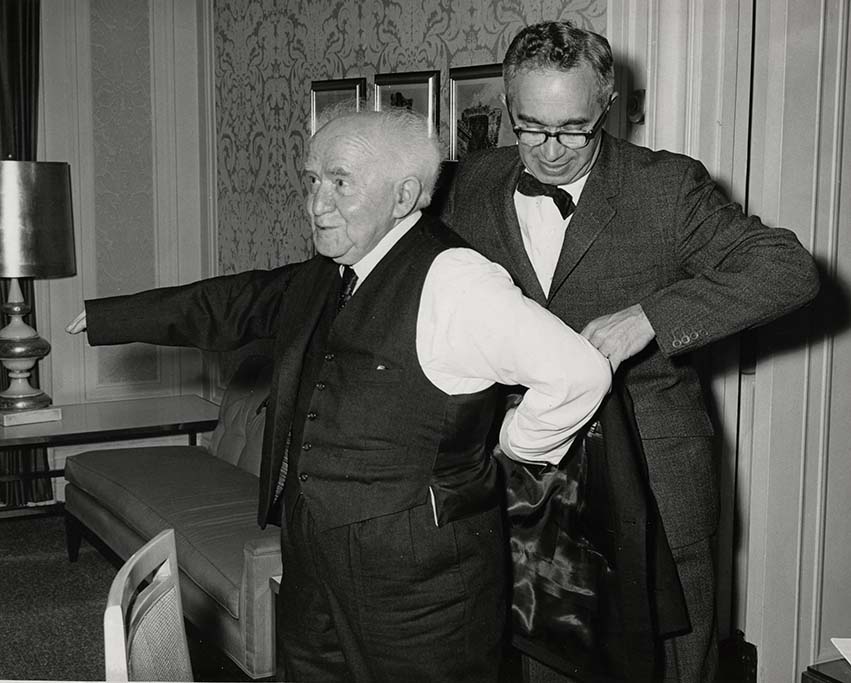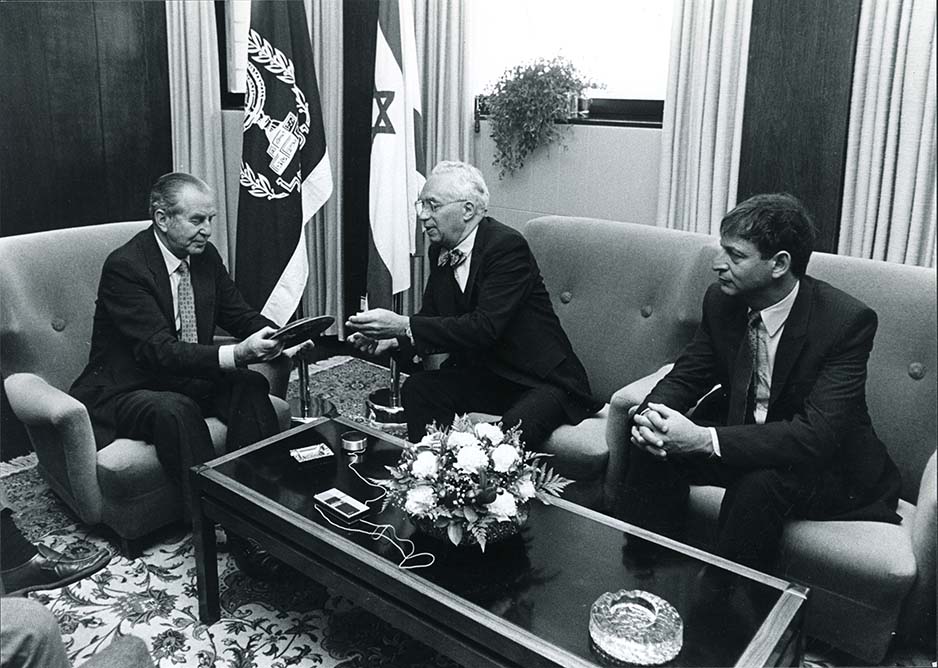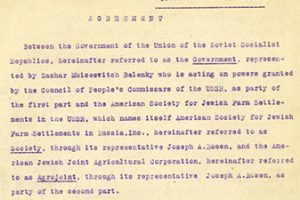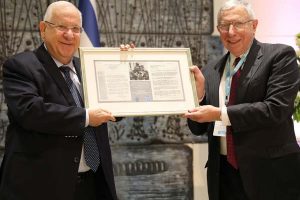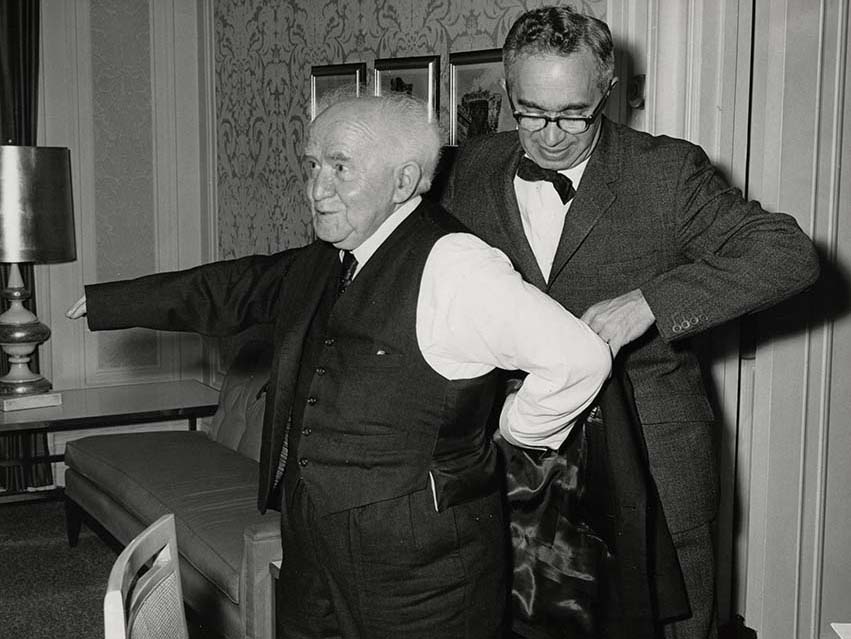
Israel and JDC: In the Words of Ralph Goldman
In 1998, on the occasion of Israel’s 50th anniversary, Ralph Goldman, JDC’s Honorary Executive-Vice President, spoke to the JDC-Israel Newsletter about JDC’s contribution to the establishment of the State of Israel and about Israel’s place in JDC’s view of the world. Ralph also shared some personal insights. Below are excerpts of his interview.
Q: Where were you when Israel was born?
A: I was working for the Hagana’s branch in the USA, which was headed at that time by Teddy Kollek. We had a lot of work to do. We arranged for the broadcast of the declaration from the Tel Aviv Museum on our radio station in a clandestine location in Queens. We were also aware that the Arabs were about to attack. Teddy Kollek and Moshe Sharett had returned to Israel a week earlier with a request from George Marshall (U.S. Secretary of State) not to declare the State, but Ben-Gurion decided to go ahead. On May 14, 1948, at 11 am American Time, I already knew that Eliyahu Epstein (later Eilat) had been asked by President Truman’s office to submit a formal application on behalf of the State for U.S. government recognition. He did so as the Jewish Agency representative in Washington thus becoming the first official representative of the State of Israel.
Q: How did a demobilized American soldier end up in the Hagana?
A: I was recruited to the Hagana by Yaakov Dori (who served as Israel’s first chief of staff). Since I knew Hebrew and had experience from my American military service, I was asked to recruit personnel – and later money and political support–and to look for military supplies and ships to take immigrants to pre-State Israel. I worked underground until May 14, 1948. I was lucky to work with some great men – Ben-Gurion and Teddy Kollek.
Q: When did you first see Jewish suffering?
A: At the end of the Second World War, when I was serving in the U.S. Army in Arles, France, I met Jewish refugees. The Catholic chaplain in my unit arranged for the Jewish chaplain to recruit Jewish soldiers. Every day from 3 pm, we provided help for the refugees. During my visits to Marseilles, I met people from the “Aliyah Bet” (for “illegal” immigration to pre-State Israel). The Joint played a vital role in this period, both in caring for the Jews in the Displaced Persons camps in Europe and in providing financial assistance to bring them to pre-State Israel. A “refugee” is someone who has nowhere to go, so that since the establishment of Israel, no Jew need be called a refugee.
Q: Is this just a moral point, or does it have practical ramifications?
A: I think it must also shape the way we provide assistance. The Jewish people cares for Jews in distress but is not a travel agency. If a Jews leaves a place of distress with an Israeli visa, it is a Jewish communal responsibility to help them in transit to Israel.
Q: How does concern for Jews fit in with concern for non-Jews?
A: JDC-Israel began to help the Israeli Arabs as early as the 1970s when we established ESHEL (the Association for the Planning and Development of Services for the Aged). JDC-Israel helps all residents of Israel who face difficulties, be they Jews or Arabs. In 1977, when I was the JDC Executive Vice-President we formalized our assistance program for non-Jews throughout the world and even began special “mailbox” campaigns in order to enable Jews to donate to non-Jews in distress. We did this for Cambodia, Ethiopia and Rwanda, among other places primarily using Israeli know-how and experts. Sometimes this enabled Israel to develop ties with countries with which it had no diplomatic relations.
Q: How was JDC-Israel established?
A: JDC was established in the U.S. in November 1914 and always helped Jews in the Land of Israel. In 1949 JDC established MALBEN (a Hebrew acronym for Institutions for the Care of Disadvantaged Immigrants). In the 1960s, MALBEN gradually began to transfer its thousand employees to the government. During the same period, when the JDC office was in Tel Aviv, I dd all I could do to bring it to Jerusalem. On January 1, 1976, the JDC office moved to Jerusalem and JDC-Israel was formally established. The Director-General was Harold Trobe, who died two years ago. JDC redefined its mission in Israel and decided to concentrate on developing innovative services and conducting research in the fields of welfare, health, and education. Our close ties with the leadership of the State helped develop partnerships with government ministries and local authorities.
Q: How was the name JDC-Israel chosen?
A: When Ben-Gurion left the government in 1965 and ran in the elections, I saw signs throughout Israel “The Old Man to MALBEN”. That pained me. I decided the time had come to change the name. We changed it first to JDC-MALBEN, and then to JDC-Israel. Later, after the JDC office moved from Tel Aviv to Jerusalem, I always noted that JDC-Israel is located between Kiryat Ben-Guion and Givat Ram.
Q: Who do we have to thank for “JDC Hill?”
A: In 1969 we began to examine the possibility of moving the MALBEN offices from Tel-Aviv to Jerusalem. I was in contact with Abe Harman, President of the Hebrew University, which owned the former Brookdale Institute building, and with Pinchas Sapir, the all-powerful Minister of Finance of that period. We eventually received a large donation to establish the Brookdale Institute. When I contacted Sapir and told him that JDC could not afford to pay the for the land, his response was that the State of Israel would present the land as a gift. The Jerusalem City Council later named the hill “JDC Hill”.
As was usual at that time, we leased the land for 49 years with an option for another 49 years, for 12 Israeli Pounds a year. I was afraid that some official would forget to pay the annual amount later, so I paid $258 in advance for the first 49 years. The bill is settled through the year 2025.
Q: What model should JDC use for its work in the coming years?
A: The ESHEL and Brookdale model has been very successful, enabling JDC to work with the organizations and to be a partner in setting policy and developing innovative services. This is why I am glad this model is also implemented for children, through ASHALIM.
Q: Does the State of Israel make Jews more secure?
A: I have no doubt that were it not for the State of Israel, the Jews in Israel and in the Diaspora would not be able to hold their heads up in pride and feel that that they are secure. Unconsciously, the American Jews need it – to remain Jews they need to be connected to Israel.
Q: What place would you like Israel to hold with regard to the JDC?
A: We must recognize that while there are many flourishing Jewish communities around the world, Israel is central to Jewish life because of our historic link to the language, the culture and the land.
Q: What role should the JDC and JDC-Israel play in the coming years?
A: For me, JDC is a global Jewish organization whose role is to help Jewish communities remain Jewish. JDC enables Diaspora Jews to connect to the community in Israel through its various programs for the disadvantaged and its social policy research efforts. As a global organization, JDC can work to build bridges. I would like to see programs based on three-way cooperation, for example between Jewish communities in Russia, America, and Israel. Our goal is not to build JDC institutions, but rather to empower each community to develop its own Jewish communal services.
Ralph Goldman (1914-2014) began his work at JDC in 1969 as the Associate Director-General of MALBEN. He served as Executive-Vice President of JDC from 1976-1985 and 1986-1988, and was JDC Honorary Executive Vice President from 1988 to 2014. The complete original text of this interview is available here.
